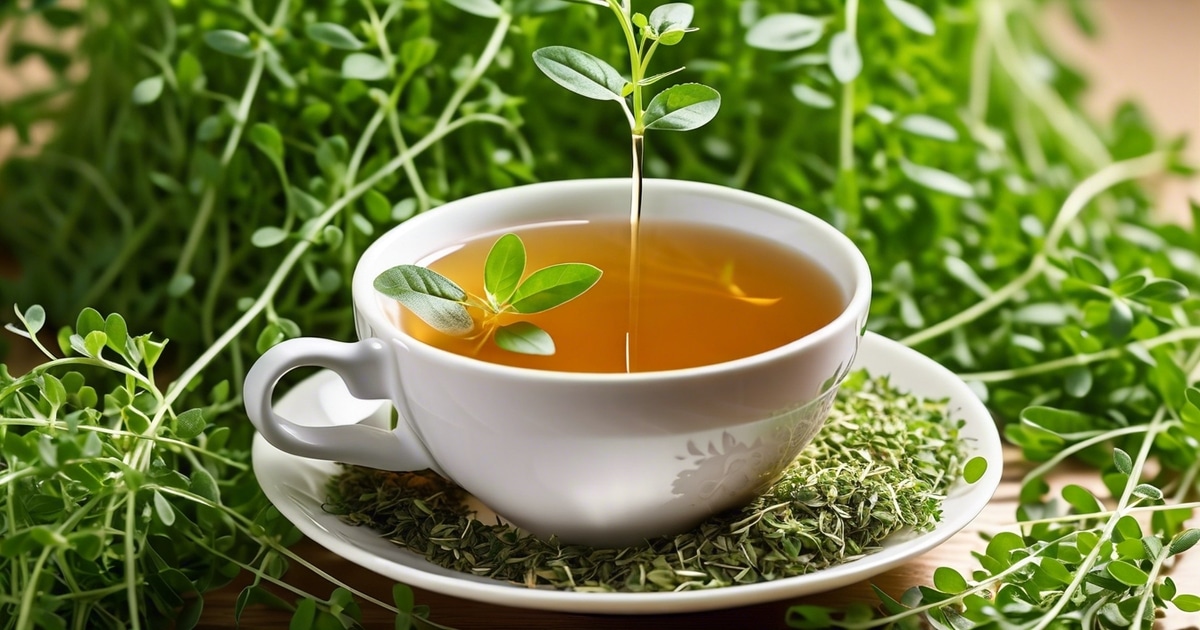Key Takeaways
- Incorporating alfalfa tea into your diet can provide essential nutrients like vitamins and minerals for overall health. Alfalfa tea is one of the herbal teas.
- Regular consumption of alfalfa herbal tea may help manage metabolic issues and alleviate symptoms associated with menopause.
- Harness the Antioxidant Power: The antioxidant properties of alfalfa tea and food can aid in fighting off free radicals, promoting better health and well-being.
- Aid in Managing Cholesterol and Diabetes: Consider adding alfalfa tea to your routine as it may assist in managing cholesterol levels and supporting diabetes management.
- Reproductive Health and Lactation Support: Incorporating alfalfa tea could be beneficial for individuals focusing on reproductive health or lactation.
- Alfalfa consumption may contribute to reducing inflammation, offering a natural way to support overall health.
- Let’s examine the benefits of alfalfa tea!
Nutritional Profile of Alfalfa Tea

Rich in Essential Vitamins and Minerals
Alfalfa tea has many vitamins A, C, E, and K, which are important for keeping our eyes, skin, immune system, and blood clotting healthy. It also has minerals like calcium, magnesium, and potassium that help make our bones strong, keep our muscles working right, and control our blood pressure. Alfalfa tea’s high nutritional content makes it an excellent protein and dietary fiber source. This means that consuming alfalfa tea can contribute to meeting daily protein needs while aiding digestion and promoting a feeling of fullness. Combining essential vitamins, minerals, protein, and dietary fiber makes alfalfa tea a valuable addition to a balanced diet.Health Benefits
The rich nutritional profile of alfalfa tea offers numerous health benefits. For instance:- Vitamin A supports good vision.
- Vitamin C boosts the immune system.
- Vitamin E acts as an antioxidant.
- Vitamin K plays a role in blood clotting.
- Calcium is essential for bone health.
- Magnesium helps regulate muscle function.
- Potassium aids in controlling blood pressure.
Alfalfa Tea for Metabolic and Menopause Symptom Relief
Support for Metabolic Function
Alfalfa tea offers benefits for metabolic function, potentially aiding in weight management. Its rich nutrient profile includes essential vitamins and minerals that support overall health. The tea’s high content of antioxidants may help combat oxidative stress, promoting a healthy metabolism. Alfalfa tea’s potential to aid in weight management stems from its diuretic properties, which can assist the body in eliminating excess fluids and reducing water retention. This natural diuretic effect may contribute to reducing bloating and mild edema, supporting efforts to maintain a healthy weight.Alleviation of Menopausal Symptoms
Traditionally used as one of nature’s herbal remedies, alfalfa tea has been valued for its ability to alleviate menopausal symptoms such as hot flashes and night sweats. Phytoestrogens present in alfalfa are believed to play a role in balancing hormone levels during menopause. The phytoestrogens found in alfalfa have been studied for their potential estrogenic effects on the body. These plant-based compounds mimic the activity of the hormone estrogen, offering relief from menopausal discomforts by helping regulate hormonal fluctuations.Antioxidant Properties of Alfalfa
Powerful Plant Compounds
Alfalfa tea is packed with plant compounds such as flavonoids and phenolic compounds. These powerful antioxidants are crucial in combating oxidative stress within the body. When consumed, these plant compounds neutralize harmful free radicals, preventing them from causing damage to cells and tissues. Regular consumption of alfalfa tea can significantly impact overall health due to its high content of beneficial plant compounds. These antioxidants are essential for protecting the body’s cells from damage caused by environmental factors, poor diet, and other lifestyle choices that may contribute to oxidative stress.Health Benefits and Well-being
The presence of potent antioxidants in alfalfa tea offers various health benefits. By consuming this herbal beverage regularly, individuals can support their body’s natural defense system against oxidative stress. This protection helps maintain healthy cellular function and contributes to overall well-being. Incorporating alfalfa tea into one’s daily routine may aid in promoting good health by safeguarding the body against cellular damage caused by free radicals present in the environment or generated internally during metabolic processes.Managing Cholesterol and Diabetes with Alfalfa Tea
Lowering Cholesterol Levels
Research suggests that alfalfa tea may positively affect lowering cholesterol levels. The soluble fiber found in alfalfa can help reduce cholesterol absorption in the gut, potentially lowering overall cholesterol levels. By incorporating alfalfa tea into their daily routine, individuals may be able to support their heart health by managing their cholesterol levels. Alfalfa’s ability to aid in lowering cholesterol can be attributed to its high content of saponins, which are plant compounds known for their potential role in reducing cholesterol absorption. These natural properties make alfalfa tea a promising addition to a heart-healthy diet to manage or prevent high cholesterol. Alfalfa tea could be especially beneficial for those looking for natural ways to improve their heart health without relying solely on medications. It offers an alternative avenue for individuals who prefer herbal remedies and want to complement conventional treatments with natural options.Regulating Blood Sugar Levels
 For individuals with diabetes or those at risk of developing the condition, incorporating alfalfa tea into their diet could potentially aid in regulating blood sugar levels. The soluble fiber in alfalfa helps slow down the release of sugar into the bloodstream after meals, contributing to more stable blood sugar levels throughout the day.
By consuming alfalfa tea regularly as part of a balanced diet, individuals may experience improved glycemic control and reduced fluctuations in blood sugar levels. This makes it particularly valuable for people within the diabetic group seeking additional support alongside standard medical treatments and dietary adjustments.
Incorporating this herbal remedy can provide extra assistance when managing diabetes or working towards better blood sugar management through lifestyle modifications and dietary choices.
For individuals with diabetes or those at risk of developing the condition, incorporating alfalfa tea into their diet could potentially aid in regulating blood sugar levels. The soluble fiber in alfalfa helps slow down the release of sugar into the bloodstream after meals, contributing to more stable blood sugar levels throughout the day.
By consuming alfalfa tea regularly as part of a balanced diet, individuals may experience improved glycemic control and reduced fluctuations in blood sugar levels. This makes it particularly valuable for people within the diabetic group seeking additional support alongside standard medical treatments and dietary adjustments.
Incorporating this herbal remedy can provide extra assistance when managing diabetes or working towards better blood sugar management through lifestyle modifications and dietary choices.
Alfalfa’s Role in Reproductive Health and Lactation
Promoting Reproductive Health
Alfalfa tea may help women with their reproductive health. Some studies show it could be good for fertility. This makes it a natural choice for women looking to support their reproductive well-being. Consuming alfalfa tea can be particularly beneficial for women looking for natural ways to enhance their fertility. The nutrients found in alfalfa, such as vitamins and minerals, contribute to its potential role in promoting reproductive health. These nutrients are essential for overall well-being and can positively impact the body’s ability to maintain optimal reproductive function.Galactagogue Properties
In addition to supporting reproductive health, alfalfa tea is also associated with enhancing milk production during lactation. It is considered a galactagogue, which means it has the potential to stimulate milk flow in breastfeeding mothers. This makes it an attractive option for nursing mothers looking for natural ways to increase their milk supply without synthetic products or medications. For those seeking a natural solution that aligns with dietary preferences and avoids artificial additives commonly found in commercial lactation products, alfalfa tea is a promising choice due to its long history of use and purported benefits supported by anecdotal evidence from various cultures.Inflammation Reduction through Alfalfa Consumption
Anti-Inflammatory Properties
Alfalfa tea contains compounds with anti-inflammatory properties, potentially reducing inflammation in the body. Regular consumption may alleviate symptoms associated with conditions like arthritis. For instance, a study showed participants experienced reduced joint pain after consuming alfalfa extract. Incorporating alfalfa tea into a healthy lifestyle can contribute to managing inflammation-related issues. This natural remedy has the potential to impact individuals suffering from inflammatory diseases positively. While there is little evidence of its direct effect, some studies have suggested that it could help reduce inflammation and improve overall health.Immune System Support
Consuming alfalfa tea may also support the immune system due to its beneficial effects on overall health. The tea’s nutrients and compounds can aid in strengthening the body’s defenses against infections and diseases. For example, it may help prevent water retention by promoting proper kidney function and reducing the risk of ulcers and bacterial contamination. Regular intake of alfalfa tea contributes to preventing blood clotting through its potential anti-clotting properties, as supported by some evidence. By incorporating this herbal drink into their diet, individuals can experience improved immune system function and overall health.Understanding the Safety and Side Effects of Alfalfa
Potential Side Effects
Excessive consumption of alfalfa tea can lead to digestive discomfort, including bloating and gas. While generally safe, it’s essential to be mindful of the quantity consumed. Alfalfa contains natural anticoagulant properties, posing a potential risk for individuals taking blood-thinning medications. This interaction could increase the effects of the medication, leading to excessive bleeding or bruising. Moderation is key when enjoying alfalfa tea. It’s crucial to be aware of any unusual symptoms after consuming the tea and consult a healthcare professional if there are concerns about its effects on digestion or other bodily functions.Consultation with Healthcare Professionals
For individuals with specific health conditions such as autoimmune disorders or hormonal imbalances, consulting healthcare professionals before regularly consuming alfalfa tea is highly recommended. Those who are pregnant should also seek medical advice due to potential risks associated with alfalfa consumption during pregnancy. The consultation will help determine whether the benefits outweigh any possible risks for the mother and baby. It’s important for everyone, especially those with underlying health issues or taking medications regularly, to consider their circumstances before incorporating alfalfa tea into their daily routine.Guidelines for Alfalfa Tea Consumption and Preparation
Preparation Process
To make alfalfa tea, steep 1-2 teaspoons of dried alfalfa leaves in hot water for 5-10 minutes. The process is simple and reminiscent of brewing any other herbal tea. Boil the water, pour it over the dried leaves, and let it steep. The traditional uses of alfalfa as a medicinal herb have made their way into modern times through various preparations like teas. Once the tea is ready, strain the leaves and enjoy a warm cup of this herbal infusion.Consumption Recommendations
Individuals are recommended to consume 1-3 cups of alfalfa tea per day for potential health benefits. This quantity aligns with typical herbal tea consumption guidelines and allows individuals to experience the potential advantages without excessive intake. Those with allergies to legumes or similar plants should exercise caution when trying alfalfa products. This includes being mindful when consuming alfalfa tea, especially if one has experienced allergic reactions to legumes or related substances.Final Remarks
Alfalfa tea is good for your health because it can help with metabolism, menopause symptoms, cholesterol, and diabetes. It has lots of good nutrients and can fight off bad stuff in your body. But be careful if you have health problems or take medicine because it might not be safe for you. Alfalfa tea can benefit you if you follow the rules for how much to drink. Consulting a healthcare professional is advisable for those considering integrating alfalfa tea into their dietary routine, particularly for individuals with existing health concerns. By seeking personalized guidance, individuals can maximize the benefits of alfalfa tea while minimizing any potential risks.Frequently Asked Questions
What are the nutritional benefits of alfalfa tea?
Alfalfa tea is rich in vitamins, minerals, and antioxidants. It contains essential nutrients such as vitamins C, K, calcium, and magnesium, which contribute to overall health.How Does the Protein Content of Alfalfa Tea Compare to Alfalfa for People?
When comparing the alfalfa protein content in alfalfa tea to raw alfalfa, it’s essential to consider the preparation process. While raw alfalfa contains higher protein levels, the protein content in alfalfa tea offers a convenient and easily digestible alternative for individuals looking to incorporate more protein into their diet.

